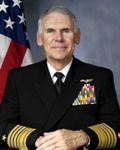
Click logo for www.SUSRIS.org home page
Item of Interest
March 19, 2007
|
U.S. Central Command
|
|
Editor's Note |
The
U.S. Central Command, or
CENTCOM, is responsible for US military forces in a region of
"over 6.5 million square miles and 27 countries including Iraq,
Afghanistan, Iran, Egypt, the countries of the Horn of Africa,
Jordan, Syria, Lebanon, the countries of the Arabian Peninsula,
Pakistan, and the Central Asian states as far north as
Kazakhstan," according to the CENTCOM Web site.
 The
command, headquartered at MacDill Air Force Base, Tampa,
Florida, activated in 1983, evolved from the Rapid Deployment
Joint Task Force, or RDJTF. That forerunner of CENTCOM was
created in early 1980 to focus US military forces responding to
the holding of American hostages by Iran and the Soviet invasion
of Afghanistan.
The
command, headquartered at MacDill Air Force Base, Tampa,
Florida, activated in 1983, evolved from the Rapid Deployment
Joint Task Force, or RDJTF. That forerunner of CENTCOM was
created in early 1980 to focus US military forces responding to
the holding of American hostages by Iran and the Soviet invasion
of Afghanistan.
U.S. Army General John P. Abizaid served as CENTCOM's Commander
since he replaced General Tommy R. Franks on July 7, 2003. On
Friday, in a ceremony overseen by U.S. Secretary of Defense
Robert Gates, General Abizaid turned over command of CENTCOM to
U.S. Navy Admiral William J. Fallon. Today SUSRIS presents for
your consideration a report on the change of command in
CENTCOM's leadership, courtesy of the CENTCOM Public Affairs
Office.
|
Admiral Fallon Assumes Command of CENTCOM
About US Central Command: |
Saudi-US
Relations Information Service
eMail: [email protected]
Web: http://www.Saudi-US-Relations.org
� 2007
Users of the The Saudi-US Relations
Information Service are assumed to have read and agreed to our terms
and conditions and legal
disclaimer contained on the SUSRIS.org Web site.

 Secretary
of Defense, Robert M.Gates, presided during the
ceremony, paying tribute to both Abizaid and Fallon
during his keynote remarks.
Secretary
of Defense, Robert M.Gates, presided during the
ceremony, paying tribute to both Abizaid and Fallon
during his keynote remarks. 











